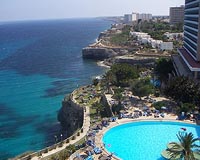| . |  |
. |
Beijing (AFP) Aug 12, 2009 The international community has limited leverage over Myanmar because of the ruling junta's close links with its powerful neighbours China, India and Thailand, analysts say. The reclusive state sparked global outrage when it extended the house arrest of democracy icon Aung San Suu Kyi for 18 months Tuesday, but analysts said its ties with the three Asian nations acted as a buffer to any foreign action. "They are a huge block (against international action)," said Ian Holliday, dean of social sciences at the University of Hong Kong and an expert on Myanmar. "China is the essential one, and India and Thailand follow in its wake." The European Union, United States and other countries have targeted Myanmar with economic sanctions and travel bans, but the military regime has so far proven impervious to these partly due to support from nations such as China. The Asian giant has long helped keep Myanmar afloat through trade ties, arms sales, and by shielding it from UN sanctions over rights abuses as a veto-wielding, permanent member of the Security Council. In return, China is assured of a stable neighbour and gets access to Myanmar's natural resources -- overall, trade between the two grew 26.4 percent to 2.6 billion dollars in 2008, according to China's ministry of commerce. On Wednesday, it called for respect of Myanmar's judicial sovereignty in reaction to Suu Kyi's house arrest. India was once a staunch supporter of Suu Kyi but shifted its strategy in the mid-1990s as security, energy and strategic priorities emerged. It is also eyeing oil and gas imports from Myanmar, needs Yangon's help in countering separatists operating along their common border, and is particularly concerned about not losing strategic ground to China in the military state. "It would not be appropriate for India to join US-led efforts if it wants to retain any influence in Myanmar," said C. Uday Bhaskar, head of the Delhi-based National Maritime Foundation think tank. Thailand has long maintained diplomatic, defence and trade ties with Myanmar despite its human rights record. Myanmar's biggest source of foreign exchange earnings is by far the revenue it receives from gas sales to Thailand -- some three billion dollars annually. Thailand, meanwhile, is largely dependent on Myanmar for its energy needs, and also has investments in telecommunications there. Lalit Mansingh, a former Indian foreign secretary, said that pressure needed to come from regional bloc ASEAN -- the Association of Southeast Asian Nations -- of which Myanmar is part. "It is gentle pressure that is going to succeed," he said. But overall, the three Asian nations' ties with the military junta -- and particularly China's influence -- make it difficult for the wider international community to influence Myanmar, analysts said. "It's helpful that India also takes the same line as China, it's helpful that Thailand is not too critical," said Holliday. "But even if they were to change their policy, the fact that China can supply just about everything that Burma needs is really essential." And in the current global crisis, China's increasing economic and political clout make it even harder for the international community to make a move against Myanmar, according to experts. "That is (due to) the Chinese economic power in the current international downturn that has also increased their political power," said Colonel R. Hariharan, a retired Indian intelligence officer. "The countries would not want to 'offend' China as they would have done very happily some years back." bgs-cltr-mbx/ph/pch Share This Article With Planet Earth
Related Links The Long War - Doctrine and Application
 Terror scare grips holiday hot spot
Terror scare grips holiday hot spot Palma De Mallorca, Spain (UPI) Aug 11, 2009 A terror scare has gripped the Spanish island of Mallorca, one of Europe's most popular tourist destinations. Authorities remain on high alert after a series of bombing attacks by Basque separatist group ETA on the Mediterranean holiday island. They are unsure whether the individuals behind the four bombings on Sunday are still hiding on the island or have already left. ... read more |
|
| The content herein, unless otherwise known to be public domain, are Copyright 1995-2009 - SpaceDaily. AFP and UPI Wire Stories are copyright Agence France-Presse and United Press International. ESA Portal Reports are copyright European Space Agency. All NASA sourced material is public domain. Additional copyrights may apply in whole or part to other bona fide parties. Advertising does not imply endorsement,agreement or approval of any opinions, statements or information provided by SpaceDaily on any Web page published or hosted by SpaceDaily. Privacy Statement |